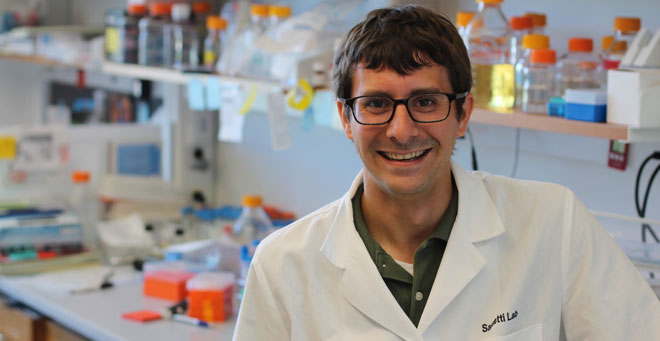 |
|
|
Andrew Olive, PhD |
Andrew Olive, PhD, a postdoctoral fellow in the lab of Christopher M. Sassetti, PhD, has been awarded a 2016 Arnold O. Beckman Postdoctoral Fellowship.
The two-year, competitive program will support Dr. Olive’s continuing investigation of M. tuberculosis in the Sassetti lab. It will also allow him to undertake his own research in hopes of establishing his own lab in the future.
“This grant will give me leverage when talking with people about starting my own lab. It will show that I’m capable of doing the work that I propose,” Olive said.
The award is given annually to postdocs “who are judged to have the highest potential for success in a career in chemistry and the life sciences, and who will become the next generation of leaders and innovators in science, engineering and technology,” said Anne Hultgren, PhD, executive director of the Arnold and Mabel Beckman Foundation.
Throughout his studies, Olive’s primary interest has been with persistent bacterial infections, such as Chlamydia trachomatis and M. tuberculosis.
Olive received his PhD from Harvard Medical School in the lab of Michael Starnbach, PhD, where he examined T-cell responses and host-pathogen interactions during chronic infections with Chlamydia trachomatis. In the Sassetti lab at UMMS, Olive uses in vivo models of resistance and tolerance in combination with global host and bacterial genetic approaches to identify immune mechanisms that prevent M. tuberculosis disease progression and might be targeted to overcome pathogen virulence strategies.
“We are using the pathogens as a tool to understand how we can optimize host immune responses and how we can drive these protective immune responses,” Olive said.
Dr. Sassetti, professor of microbiology & physiological systems, said Olive has been able to pick apart longstanding questions in the field, including how to intervene and treat TB now that it appears that millions become sick because of a failure of anti-inflammatory pathways.
“This fellowship was given to exactly the right person in just the right career stage,” Sassetti said.
Olive credits Sassetti and others with forming his opinion that science is a team effort.
“For me, I’ve had really good collaborators and really good mentors. I think that they don’t get enough credit for training us responsibly and in ways that we can help train the next generation of scientists,” he said. “With science being really competitive these days with funding and getting jobs, I think we can lose that edge of cordial interactions with each other, people become guarded about data. What I like about the TB field is we’re all pretty open. It’s a team effort.”